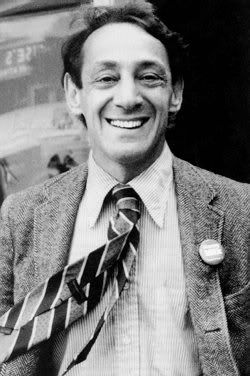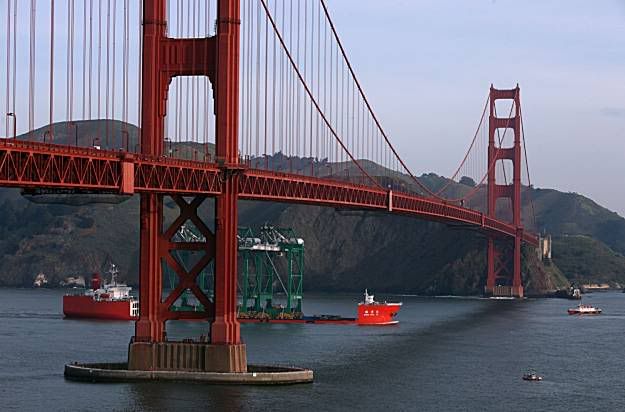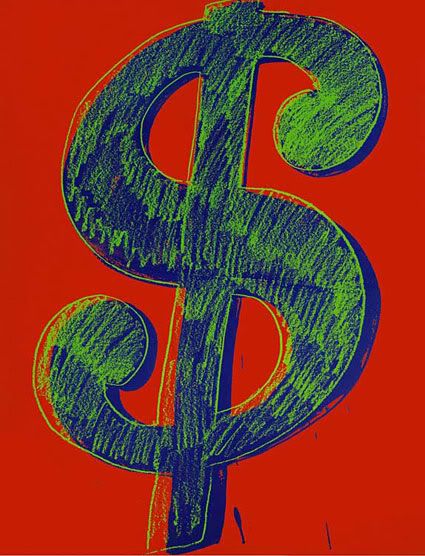
My name is Harvey Milk - and I want to recruit you!
Most people familiar with Harvey Milk's life know this quote - or at least remember Sean Penn's portrayal of Harvey's 1978 Gay Freedom Day Parade speech in
Milk. What some might not be so familiar with is the postcard he was given just before he began that speech in front of over a quarter million people. It read simply
You get the first bullet the minute you stand at the microphone.
This threat was not the first death threat he'd ever received, and it would not be the last. When the end did come, it came from a place & person much more close than he could've imagined. However, instead of devoting much if any discussion to the person who murdered 2 people in cold blood, the aftermath of what he did, and hoping he's burning in the hell in which he so vehemently believed, I want to talk about Harvey Milk's life & what he accomplished in such a short time in a life cut short way way too soon.
Randy Shilts in writing The Mayor of Castro Street: The Life & Times of Harvey Milk interviewed many who grew up with, went to school with, and worked with Harvey Milk long before he became the "mayor of Castro Street." Harvey Bernard Milk was born in Woodmere, NY on May 22, 1930, and until he actually moved to the Castro neighborhood in San Francisco in 1972, nearly no one in his "east coast life" knew he was a homosexual because he was good at living the double life in which homosexuals were (and some still are) largely forced to live. He was a high school athlete, a sports reporter & editor of his college's newspaper, an honorably discharged junior grade lieutenant in the US Navy after his tour was up, a Wall Street financial analyst, and even distributed Barry Goldwater campaign literature in 1964!

What turned Harvey from a Goldwater Republican to a "bleeding heart liberal"? It was actually his life - long love of theater, his talent for business, and being at the right place at the right time. A friend of his asked Harvey to be involved on the business side of a little show in which he was involved called Hair. After the show became the success it did, Harvey followed a lover to San Francisco who was the stage director for the production there. After the relationship ended, Harvey moved in with many of the cast members from the show & began to be moved by the political and social consciousness of the actors. After wearing his 3 - piece suit for his "day job" as an analyst in San Francisco's financial district, he'd join his roommates in marches to protest the Vietnam War. Harvey was so enraged at our nation's invasion of Cambodia in April 1970 that he burned his Bank of America card at a huge anti - war rally over his lunch hour. He was fired from his job and never looked back.
San Francisco had long been a haven for the outsiders of "civilized society." However, after massive dishonorable discharges for soldiers ready to fight WWII who were discovered to be homosexual and the homosexual purges in the federal government in the McCarthy era, San Francisco became the place to stay for all of these men who were too afraid or too ashamed to go back to where they came from.

The increase in the gay population seemingly overnight led to economic clout due to the change in the nature of the job base in the city from blue - collar factory work to a more white - collar leaning job base toward tourism & other jobs that required years in college or a college degree. With economic clout came political clout & the creation by local homosexual men and women of political organizations geared specifically to that community in San Francisco. It was this environment that made the prospect of a homosexual elected to a government office more than just a dream.
A combination of local issues & many "bigger picture" issues that are still at the center of political discourse in this country today brought Harvey Milk into politics. Around a month after opening Castro Camera with his lover, Scott Smith, in the spring of 1973, a local "Chamber of Commerce" - type dropped by to inform Harvey that he could no longer operate his business until he'd paid a $100 deposit against sales taxes. After many irate trips to city hall & negotiating the fee down to $30, one of Harvey's interests became the rights of small business owners against corporate & government interference. Funding for & access to education became an issue when a high school teacher dropped by Castro Camera to see if she could borrow a slide projector for her class. Requisitioning one would take over a month. Harvey was incensed; millions were being poured into massive real estate development & other "downtown" interests while teachers & students were barely getting by. The final issue that brought Harvey to politics was the classic "throw the bums out" mentality. Nearly every day in Castro Camera, a small TV was playing the Watergate hearings, and Harvey was crazy angry at John Mitchell's repeated "I don't recall" answers to the questions posed to him.

So, Harvey, still with his mustache, long hair, and pony tail, decided to run for a seat on the San Francisco Board of Supervisors in 1973. He also found, for the first time in his life, a "safe" place for homosexuals, so the double life he had lived for his whole life up to that point was over, and he was very open & ready to talk about his sexual orientation & the growing power that came with it. The "gay establishment" in San Francisco wasn't ready for this brash "carpet bagger" from the East Coast & thought he should keep quiet, pay his dues (so to speak) locally, then, some day, he'd be ready for local politics. Despite this resistance, Harvey came in 10th out of 32 spots & garnered 17,000 votes because of good 'ol fashioned American politicking that he stuck with for the rest of his career; he knocked on doors, he went to neighborhood meetings, he went to coffee shops, he & others stood on street corners to hand out campaign fliers, and he shook any hand that was nearby. Two weeks after that defeat, Harvey cut his hair, shaved his mustache, bought some suits, and immediately began to get ready for the next election cycle in 1975.
By the time of the November 1975 municipal elections, Harvey had the support of the Teamsters & other unions because of his help in boycotting Coors beer from gay bars in the Castro district, he became the president of the Castro Village Association that solidified the economic power of the neighborhood, and he'd become increasingly angry at the corporate - friendly atmosphere of the government "downtown" at the expense of neighborhoods that were suffering.

All six incumbent city supervisors won re - election that year, but Harvey came in 7th. His time was coming, and the election of George Moscone as mayor promised a more receptive ear to the concerns of & the power of the gay community in city hall.
In November 1976, the way city supervisors were elected changed from a city - wide race to individual districts within the city. The neighborhood around the Castro district became District 5 (the exact areas he'd won by wide margins in previous elections), and on Election Day in November 1977, Harvey Milk became this country's first open homosexual elected to public office. His victory made national & international news.
Nearly everyone Randy Shilts interviewed for the book spoke of Harvey's humor, playfulness, his love of practical jokes, his charisma, etc.; however, they also spoke of another quality of Harvey's that was deemed rather unnerving - his fatalism. When early friends of his suggested that he set aside some money for after his retirement, he'd reply nonchalantly that he'd die before he ever became a senior citizen. Before the 1973 election, when asked how a very underfunded Harvey could possibly compete with incumbents, he had the following reply according to Shilts' book:
'Well,' Harvey quickly replied, 'I figured that since I am openly gay, some father who is nuts and upset over the Texas homosexual killings will come out and shoot me.' Milk paused briefly, as if he had calculated this possible denouement on an actuarial table. 'I figure that I'll be lucky and survive and I'll get a lot of sympathy votes, as well as the liberal and gay votes.'
As Harvey's fame grew, so did the threats of violence & the death threats.
One week after his victory in 1977, he recorded 3 tapes that became known as his "political will." In those tapes were also the names of those he
did not wish to succeed him on the Board of Supervisors plus those who met with his approval. This YouTube video is part of one of those tapes; the voice you'll hear is Harvey's.
During Harvey's 11 month tenure on the Board of Supervisors, he continued to campaign & legislate at a manic pace staying up all hours studying proposals and not being willing to put off anything until "tomorrow" because Harvey sincerely felt there would be no "tomorrow" for him. We all sadly now know that was gunned down in the mid - morning hours of November 27, 1978 less than an hour after the assassination of Mayor George Moscone.
Harvey Milk was 48 years old when he was murdered. However, remembering that he spent the vast majority of his life as a closeted gay man & was no sort of political activist whatsoever, much of what he accomplished, much of what for which he's remembered, and the better (but not perfect) acceptance of homosexuals & their rights today because of his efforts was done in just over 5 years...5 YEARS. If Harvey was with us today, I'd wager he'd have a field day with "Corporations are people, my friend," and the odious effects of the Citizens United ruling that made our current elections the play things of the super - rich only. He'd be absolutely thrilled at the number of states where marriage equality survives (including his birth state!) but horribly saddened & angered at marriage equality picture in his "adopted" home state. However, that sadness & anger would lead him to action. As Harvey said many times in his now - famous "stump speech,"
And the young people in the Altoona, Pennsylvanias and the Richmond, Minnesotas who are come out and hear Anita Bryant on television and her story. The only thing they have to look forward to is hope. And you have to give them hope. Hope for a better world, hope for a better tomorrow, hope for a better place to come to if the pressures at home are too great. Hope that all will be all right.


